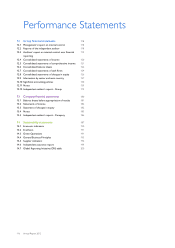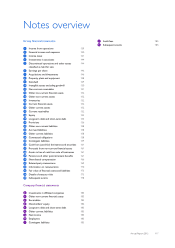Philips 2012 Annual Report Download - page 109
Download and view the complete annual report
Please find page 109 of the 2012 Philips annual report below. You can navigate through the pages in the report by either clicking on the pages listed below, or by using the keyword search tool below to find specific information within the annual report.11 Corporate governance 11.1 - 11.1
Annual Report 2012 109
to the balance sheet with explanatory notes, considering the acquisition
or manufacturing price, exceeds EUR 17.5 million; (ii) the net turnover
exceeds EUR 35 million; or (iii) the average number of employees
equals or exceeds 250.
Pursuant to new Dutch legislation effective January 1, 2013, the
Company shall pursue a policy of having at least 30% of the seats on
the Board of Management held by men and at least 30% of the seats
held by women. The rule will cease to have effect on January 1, 2016.
The Company has formalized its rules to avoid conflicts of interests
between the Company and members of the Board of Management. The
Articles of Association state that in the event of a legal act or a lawsuit
between the Company and a member of the Board of Management,
certain of such member’s relatives, or certain (legal) entities in which a
member of the Board of Management has an interest, and insofar as the
legal act is of material significance to the Company and/or to the
respective member of the Board of Management, the respective
member of the Board of Management shall not take part in the decision-
making in respect of the lawsuit or the legal act. Resolutions concerning
such legal acts or lawsuits require the approval of the Supervisory
Board. Newly adopted Dutch legislation on conflicts of interest,
effective January 1, 2013, no longer contains restrictions on the powers
of directors to represent the Company in case of a conflict, but
provides that a member of the Board of Management may not
participate in the adoption of resolutions if he or she has a direct or
indirect personal conflict of interest with the Company or related
enterprise. If all members of the Board of Management have a conflict,
the resolution concerned will be adopted by the Supervisory Board.
These rules apply to members of the Executive Committee
correspondingly.
Legal acts as referred to above shall be mentioned in the Annual Report
for the financial year in question. The Rules of Procedure of the Board
of Management and Executive Committee establish further rules on the
reporting of (potential) conflicts of interests. No legal acts as referred
to above have occurred during the financial year 2012.
Amount and composition of the remuneration of the Board
of Management
The remuneration of the individual members of the Board of
Management is determined by the Supervisory Board on the proposal
of the Remuneration Committee of the Supervisory Board, and is
consistent with the policies thereon as adopted by the General Meeting
of Shareholders. The remuneration policy applicable to the Board of
Management was adopted by the 2004 General Meeting of
Shareholders, and lastly amended by the 2008 General Meeting of
Shareholders and is published on the Company’s website. A full and
detailed description of the composition of the remuneration of the
individual members of the Board of Management is included in chapter
10, Supervisory Board report, of this Annual Report.
The remuneration structure, including severance pay, is such that it
promotes the interests of the Company in the medium and long-
term, does not encourage members of the Board of Management to
act in their own interests or take risks that are not in line with the
adopted strategy, and does not reward failing members of the Board of
Management upon termination of their employment. The level and
structure of remuneration shall be determined in the light of factors
such as the results, the share price performance and other
developments relevant to the Company. Deviations on elements of the
remuneration policy in extraordinary circumstances, when deemed
necessary in the interests of the Company, will be disclosed in the
Annual Report or, in case of an appointment, in good time prior to the
appointment of the person concerned.
The main elements of the contract of employment of a new member
of the Board of Management - including the amount of the fixed base
salary, the structure and amount of the variable remuneration
component, any severance plan, pension arrangements and the general
performance criteria - shall be made public no later than at the time of
issuance of the notice convening the General Meeting of Shareholders
in which a proposal for appointment of that member of the Board of
Management has been placed on the agenda. From August 1, 2003
onwards, for new members of the Board of Management the term of
their contract is set at four years, and in case of termination, severance
payment is limited to a maximum of one year’s base salary; if the
maximum of one-year’s salary would be manifestly unreasonable for a
member of the Board of Management who is dismissed during his first
term of office, the member of the Board of Management shall be eligible
for a severance payment not exceeding twice the annual salary. Current
members of the Board of Management are employed by means of a
contract of employment. Pursuant to newly adopted Dutch legislation,
effective January 1, 2013, new members of the Board of Management
will be employed by means of an agreement of assignment
(overeenkomst van opdracht).
In 2003, Philips adopted a Long-Term Incentive Plan (‘LTI Plan’), lastly
amended by the 2009 General Meeting of Shareholders, consisting of a
mix of restricted shares rights and stock options for members of the
Board of Management, Philips executives and other key employees. This
LTI Plan was approved by the 2003 General Meeting of Shareholders.
For more details on the LTI Plan please be referred to the Annual
Report 2011 and the Remuneration Report of the Supervisory Board
in this Annual Report. A fully revised LTI Plan applicable to members
of the Board of Management will be submitted to the 2013 General
Meeting of Shareholders for approval. The revised plan consists of
performance shares only, shifting away from pre-grant measurement of
performance over a period of three years preceding the grant to a more
standard three year post-grant performance measurement. The
performance shares will replace the original number of options in each
grant. For more details please be referred to the Remuneration Report
of the Supervisory Board in this Annual Report and the Agenda of the
2013 General Meeting of Shareholders.
The so-called ultimum remedium clause and claw-back clause of best
practice provisions II.2.10 and II.2.11 of the Dutch Corporate
Governance Code is applicable to Annual Incentive payments and LTI
grants for the year 2009 onwards to all members of the Board of
Management. In respect of the LTI grants, the ultimum remedium clause
can be applied to the performance-related actual number of stock
options and restricted share rights that is (unconditionally) granted.
Members of the Board of Management hold shares in the Company for
the purpose of long-term investment and are required to refrain from
short-term transactions in Philips securities. According to the Philips
Rules of Conduct on Inside Information, members of the Board of
Management are only allowed to trade in Philips securities (including
the exercise of stock options) during ‘windows’ of ten business days
following the publication of annual and quarterly results (provided the
person involved has no ‘inside information’ regarding Philips at that time
unless an exemption is available). Furthermore, the Rules of Procedure
of the Board of Management and Executive Committee contain
provisions concerning ownership of and transactions in non-Philips
securities by members of the Board of Management. Members of the
Board of Management are prohibited from trading, directly or
indirectly, in securities of any of the companies belonging to the peer
group, during one week preceding the disclosure of Philips’ annual or
quarterly figures. These rules apply to members of the Executive
Committee correspondingly. Transactions in shares in the Company
carried out by members of the Board of Management or members of
the Supervisory Board and other Insiders (if applicable) are notified to
the Netherlands Authority for the Financial Markets (AFM) in
accordance with Dutch law and, if necessary, to other relevant
authorities.
Indemnification of members of the Board of Management
and Supervisory Board
Unless the law provides otherwise, the members of the Board of
Management and of the Supervisory Board shall be reimbursed by the
Company for various costs and expenses, such as the reasonable costs
of defending claims, as formalized in the Articles of Association. Under
certain circumstances, described in the Articles of Association, such as
an act or failure to act by a member of the Board of Management or a
member of the Supervisory Board that can be characterized as
intentional (‘opzettelijk’), intentionally reckless (‘bewust roekeloos’) or
seriously culpable (‘ernstig verwijtbaar’), there will be no entitlement
to this reimbursement. The Company has also taken out liability
insurance (D&O - Directors & Officers) for the persons concerned.
In line with regulatory requirements, the Company’s policy forbids
personal loans to and guarantees on behalf of members of the Board
of Management or the Supervisory Board, and no loans and guarantees
have been granted and issued, respectively, to such members in 2012,
nor are any loans or guarantees outstanding as of December 31, 2012.
The aggregate share ownership of the members of the Board of
Management and the Supervisory Board represents less than 1% of the
outstanding ordinary shares in the Company.
























